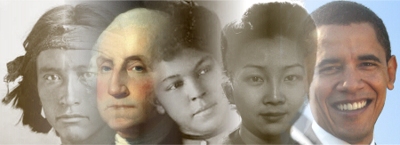 |
OneHistory.org | Moments in History |
| home about us contact us visual history reading history multicultural quizzes teacher feature index | ||
Jenny Slew and Elizabeth Freeman Jenny Slew was born in about 1719 to a white woman and a Black man. That fact would become the core of a historic legal case forty-six years later. In 1762, Jenny Slew apparently lived as a free woman. In that year, however, she was kidnapped and enslaved. Three years later, she went to court to sue for her freedom. In most of the colonies, she would not have been able to turn to the law for help. As a slave, she would have been banned from the courts. However, by that time in Massachusetts an enslaved person could bring a civil suit. Jenny Slew simply stated that, because her mother was free, she was free. The lower court ruled against her, but she kept fighting. She took her case to the Superior Court. In both cases, the slaveholder attacked Slew's legal right to sue him, for any reason. He pointed out that Slew had been married. As a married woman, she had no identity separate from her husband and therefore could not sue on her own behalf. In other words, a slave could appeal to the law but a married woman could not. Slew almost didn't get her case to court for this reason. She had indeed been married, and more than once. She was saved by the fact that she had been married to slaves, so the validity of her marriages was called into question. The Superior Court agreed to hear her case. Jenny Slew won her freedom. She was also awarded court costs and damages, in the amount of four pounds. .een years later, another Black woman went to court in Massachusetts in order to obtain freedom, not only for herself, but for all those enslaved in that state. Elizabeth Freeman, also known as Mum Bett, could not read or write, but she could certainly think. Hearing that the newly passed state constitution declared all men equal and entitled to freedom, Freeman engaged counsel to sue for her freedom, and that of a Black man named Brom, on that basis. Their enslavement, Freeman argued, violated the constitution. This was the first time anyone had challenged slavery by insisting that it was against a state's constitution. Amazingly, Freeman won. She and Brom were granted freedom. Not so amazingly, the suit did not free all of the slaves in Masssachusetts. But the case was the first in American history that was intended to free, not a particular individual, but all enslaved people. Slew and Freeman were among the first in a long line of Black Americans who asked the law to defend their freedom and humanity. Some would be denied and some would have their petitions answered. But faith in law would continue to be a mainstay of the search for justice.
|
Elizabeth Freeman, 1811. A miniature painting , watercolor on ivory, done by Susan Anne Livingston Ridley Sedgwick, Freeman's lawyer's daughter. Courtesy of the Massachusetts Historical Society. |
|
